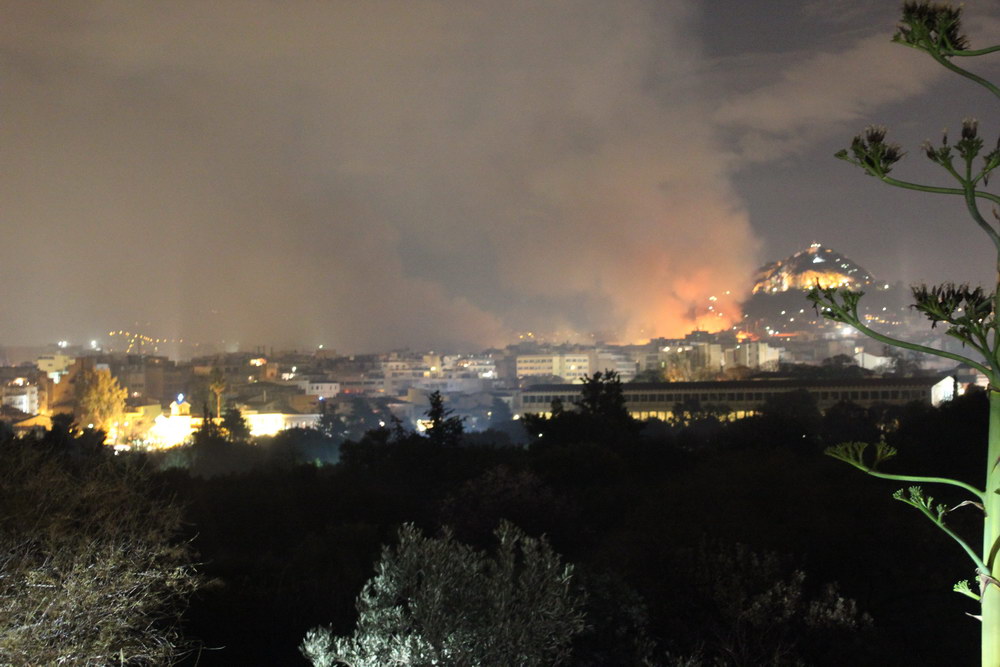
(Photo by Real Democracy GR – MultiMedia Team )
Greece’s political establishment trembles as banks and government offices burn amid violent anti-austerity riots. Has the country finally reached a tipping point?
Exactly ten years ago, the crisis-ridden country of Argentina spiraled into a bout of social unrest that would eventually lead to the largest sovereign default in history. After three years of being forced to swallow the bitter pill of IMF-imposed austerity, a tipping point was finally reached: foreign creditors and neoliberal governments had pushed the people too far. They rose up in defiance and ousted five successive Presidents in the space of just three weeks.
With the incredible images of flame-engulfed buildings and policemen emerging out of Athens, it now looks like Greece may be headed down the same path. The country has become ungovernable. Even though a majority of traitors was found to pass yet another deeply unpopular austerity package through Parliament, this weekend’s violent protests indicate that the ‘Argentina moment’ may have arrived. The Greek people simply can’t take any more austerity.
As the protests around Spain come to an end, the signs of weakness shown by the 15M movement over the past weeks - the frustration against the slow assemblies, the possibility of violence inside of the pacifist ideals (violence in Barcelona http://www.europeanrevolution.net/?p=539) or the lifting of the camps - have been forgotten after the massive protest carried out in over 30 cities nationwide. According to the techno ant map (here ) the protest happened in 98 cities internationally. The number of protesters is, as always, hard to know for certain. The main media source in Spain, El Pais, claims that around 200,000 people participated in the major protests, making the number probably higher.
In Barcelona a whopping 100,000 people marched according to most sources. It was larger than in Madrid where 35,000 to 50,000 people participated in the event. Some say, however, that over 100,000 were present throughout the day. It is truly hard to tell. Six columns initiated the protest marching towards Congress from different neighborhoods around Madrid.
Madrid today:
Депешата [10SKOPJE53] (некласифицирана UNCLASSIFIED), испратена од скопската амбасада и напишана од амбасадорот Рикер на 5 февруари 2010 во која американскиот амбасадор Рикер ги брифира сенаторите Воинович (Voinovich) и Шахин (Shaheen) за состојбите во Република Македонија е ИДЕНТИЧНА на содржината на депашата [10SKOPJE64] во која амбасадорот Рикер го брифира конгресменот Померојза состојбите во Република Македонија!
Депешата [10SKOPJE64] од 11 февруари 2010 година (некласифицирана) ја напишал амбасадорот Рикер од скопската амбасада и во неа ги сумирал разговорите што ги имал со конгресменот Померој при неговата посета на Република Македонија под наслов:
Евро- атланските напори остануваат блокирани
Кратко резиме:
Амбасадорот Рикер на конгресменот Померој му рекол дека 1. американската долгорочна цел е Република Македонија да биде дел од ЕУ и НАТО, но интеграции се во застој поради проблемот со името; 2. Земјата има затегнати меѓуетнички односи; 3. Во земјата има проблеми со владеењето на правото, и со корупцијата; 4. Спори економски реформи.

Bivol.bg (partial translation)
Bulgarian Chief Prosecutor, Boris Velchev, has painted an apocalyptic picture of the state of the prosecution services in the country at a meeting with American Ambassador, John Beyrle, held soon after Velchev’s election to the post. This has been revealed in a cable written by Beyrle, dated February 7, 2006, and leaked by Wikileaks [06SOFIA198].
The prosecutor’s office under the leadership of Velchev’s predecessor, Nikola Vilchev, was described by the new Chief Prosecutor as "some kind of terrorist organization" used to settle political and business scores, but totally incapable of fighting crime.
Empty files and hostile deputies, who did not even want to talk to him, is what Velchev stumbled upon at the prosecution services. He had described his priority of cleansing the institution from corrupt prosecutors as "some kind of a war".
Velchev’s “war,” however, has implications beyond the borders of Bulgaria – it must lead to effective guilty verdicts of organized crime bosses, one of the top requirements of the EU, monitoring Bulgaria before its accession to the Union.
Facing the outrageous failure of Bulgarian prosecutors and law enforcement to collect sound evidence against the leaders of organized crime, the Chief Prosecutor declares, according to Bayrle, his equally outrageous plan to seek “a contract with the Courts.” Ambassador Beyrle explains this means appealing to judges to sentence criminal bosses “based on evidence that otherwise might not pass muster“.
The European Court of Justice, the highest court in Europe, today gave its preliminary opinion on the appeal case between artists’ rights agency Sabam (Société Belge des Auteurs, Compositeurs et Editeurs) and ISP Scarlet Extended. Sabam won a court order in 2007 in Brussels Court which would force the ISP (then called Tiscali) to block users from illegally downloading copyrighted material and gave it six months to install the approved system Audible Magic music fingerprinting system. The ISP said the spying on its customers this entailed would be illegal.
In the preliminary opinion, which is usually the basis of the final ruling, Advocate General Cruz Villalón considers that the installation of that filtering and blocking system is a restriction on the right to respect for the privacy of communications and the right to protection of personal data, both of which are rights protected under the Charter of Fundamental Rights. By the same token, the deployment of such a system would restrict freedom of information, which is also protected by the Charter of Fundamental Rights.
The Advocate General also objected to the system on the grounds that it would operate “…in abstracto and as a preventive measure, which means that a finding would not first have been made that there had been an actual infringement of an intellectual property right or even that an imminent infringement was likely.”
Theme by Danetsoft and Danang Probo Sayekti inspired by Maksimer